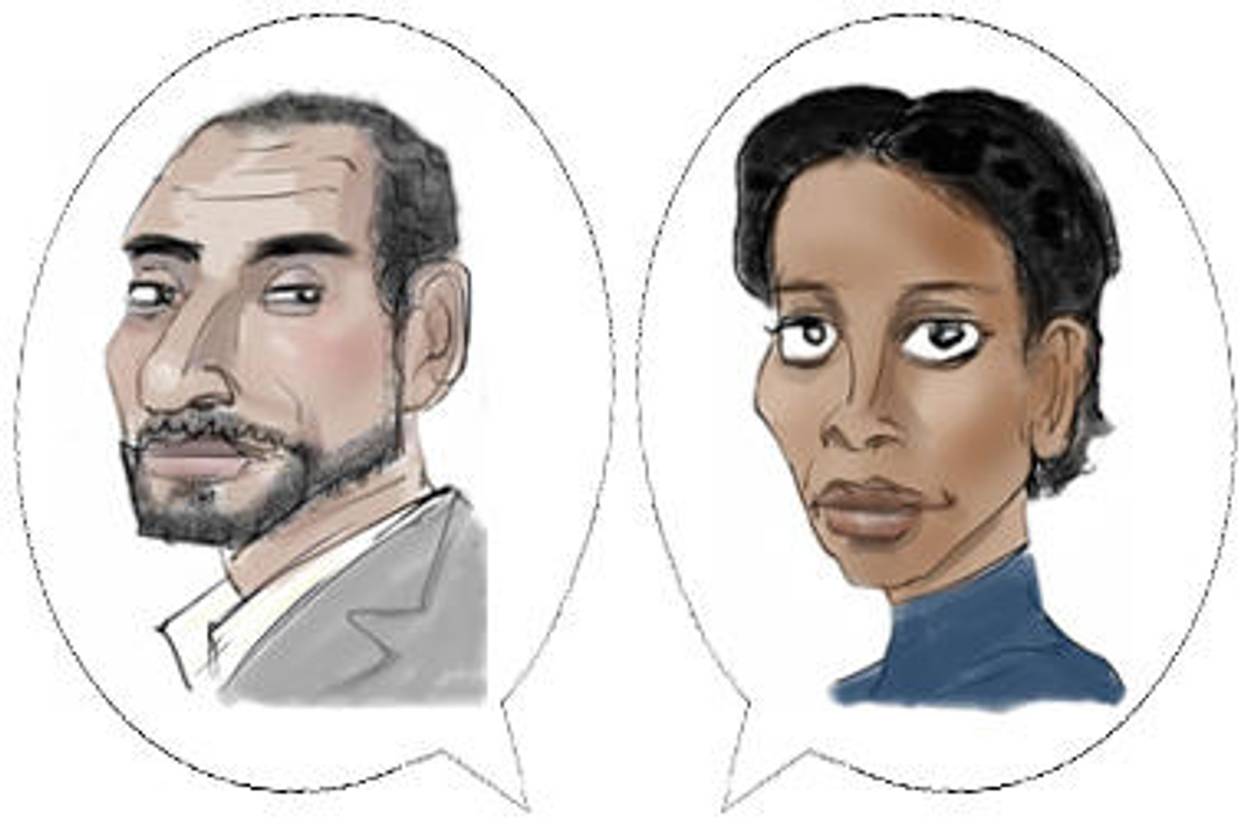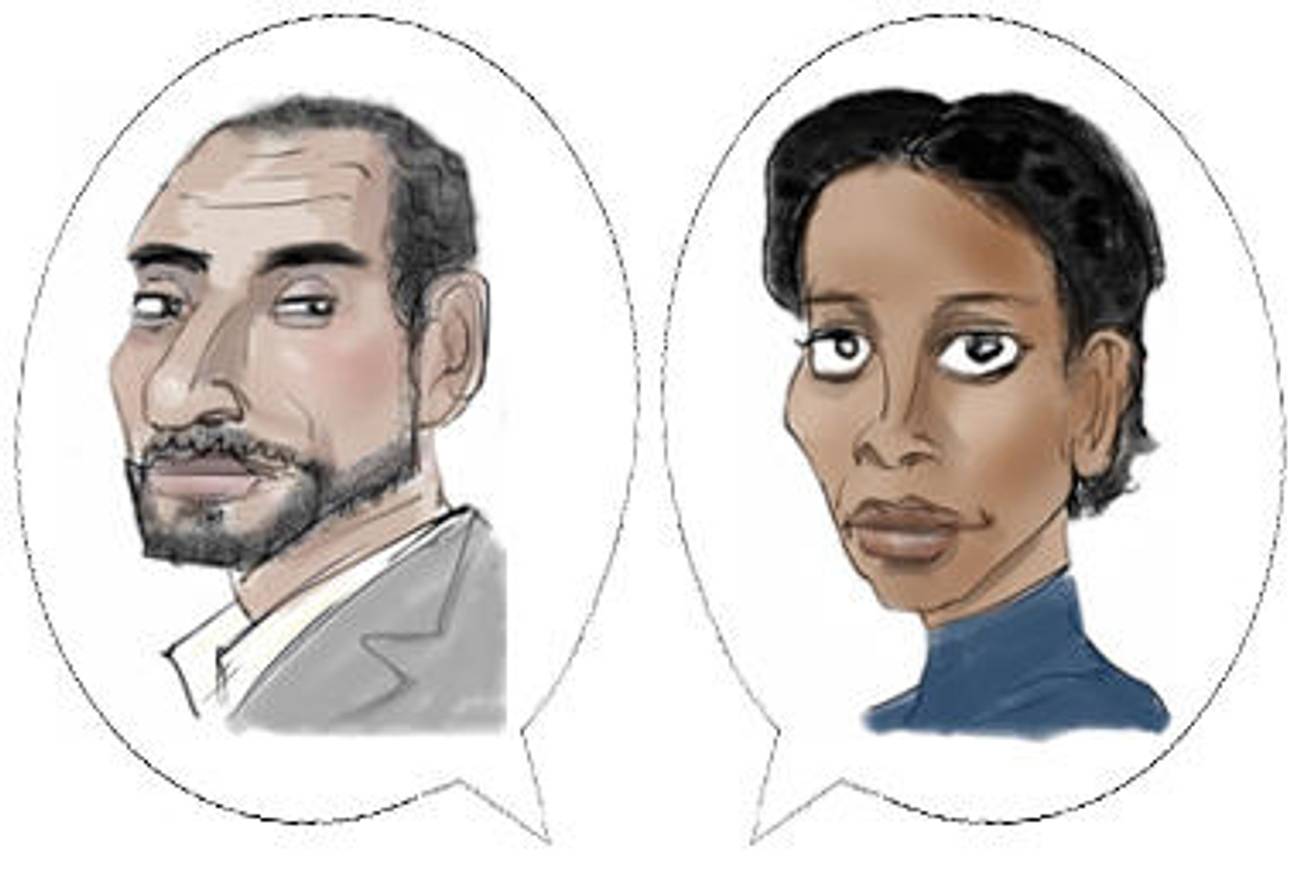Fundamentals
Muslim intellectual Tariq Ramadan, Somali refugee Ayaan Hirsi Ali, and Paul Berman’s new ‘Flight of the Intellectuals’




“Look here upon this picture, and on this …” In the left frame, a privileged young Swiss-Egyptian academic, whose father and grandfather were pillars of the Muslim Brotherhood and who has expressed strong sympathy for the jihadist preachings—and social and moral precepts—of Sheikh Yusuf al-Qaradawi, purveyor of fatwas and self-described “Mufti of martyrdom operations.” In the right frame, a young woman from Somalia who has endured genital mutilation and forced marriage, made her escape to Europe, spoken out for the rights of women, seen a colleague of hers murdered for the same advocacy, abandoned religion for the values of the European enlightenment, and now conducts her life under permanent police protection.
Which of these two individuals garners the most respectful attention from our liberal intellectuals? To phrase it more closely, which of them has attracted the sympathetic understanding, and which the contempt, of two of the contemporary writers who have best earned that title? I refer to Timothy Garton Ash and Ian Buruma, who in the years during and after the Cold War did a great deal to enlarge our understanding of Eastern Europe and Asia, and to demonstrate the incompatibility of civilization with the principles of totalitarianism.
Ian Buruma has written a long profile of Tariq Ramadan (the picture in the left frame) and taken many of his claims to be a reformist and modernizer at their own face value. Timothy Garton Ash was helpful in getting Ramadan a position at St. Antony’s College, Oxford. Both men have written disparagingly of Ayaan Hirsi Ali, as if she were an intemperate extremist. Oh, and one more thing. Garton Ash has written that “It’s no disrespect to Ms. Ali to suggest that if she had been short, squat, and squinting, her story and views might not be so closely attended to.” Perhaps that statement is indeed free from any hint of disrespect, but can the same be said of Garton Ash’s judgment that for all her courage she is no more than a “slightly simplistic Enlightenment fundamentalist”? (The appellation “Enlightenment fundamentalist” is itself borrowed from Ian Buruma; I should perhaps declare at this stage that I find the ideas of the Enlightenment to be superb in their simplicity.) Meanwhile, it’s hardly possible to read of a media appearance with Tariq Ramadan that does not describe him as arrestingly handsome and charismatic. No disrespect, of course, but I’d be the first to agree that it can’t be his writing that draws the crowd. (His book, In The Footsteps of the Prophet, tells with admirable literal-mindedness the story of Mohammed undergoing two open-heart surgeries at the hands of angels and makes the assumption that djinns, or spirits, are all around us. This is something more than simplistic.)
I have the luck to count both Garton Ash and Buruma among my friends and to have been able to discuss all this with them. Garton Ash told me that he viewed the clash with militant Islamism in a way that is partly analogous to the Cold War. In that period, magazines like Encounter took the view that the most potent opponents of Stalinism were those intellectuals and writers who had cured themselves of it, or quarreled with it, but who were still of the “Left.” He meant people of the stature of George Orwell, Arthur Koestler, Stephen Spender, Ignazio Silone, and Richard Wright. It followed, therefore, that Islamic extremism is best countered by Islamic “moderates.” (We simply must evolve a better term than that; nobody wants to claim such a tepid and condescending title for themselves.)
A problem presents itself at once: If you are looking for Islamic “moderates” you will certainly find them. “Seek and ye shall find” is, in fact, part of the problem to begin with. On numberless occasions, well-meaning governments in Western Europe and the United States have appointed, as interlocutors with Islam, men who have turned out to have a not-so-hidden sympathy with clerical violence. One might instance, in Britain, Iqbal Sacranie, who said that murder was too good for Salman Rushdie and was later knighted by Tony Blair. In the United States, Abdurahman Alamoudi, the man invited to the White House and given the job of appointing Muslim imams in the U.S. armed forces, was later imprisoned for a variety of undesirable associations and activities.
Ian Buruma’s objections are of a slightly different kind. He sometimes seems to think that where Islamism is concerned, we have little to fear except the fear of it itself. This widely shared attitude has condensed into one word—the neologism “Islamophobia.” A phobic is a person suffering from irrational or uncontrollable dread. I don’t choose to regard my own apprehensiveness about Muslim violence as groundless or illusory. Buruma may have the ghost of a point when he says that alarmism about Muslim demographic growth in Europe, say, has been overdone. But just to take the professional areas in which he and I and Garton Ash toil—the areas of journalism, publishing, and the academy—it has been quite astonishing to see how far and how fast there has been a capitulation to the believable threat of violence.
Not a single mainstream American media outlet, for example, would show the actual cartoons that had been used as a well-choreographed pretext for a sabotage of the Danish economy and society. When a small magazine for which I write (the secular Free Inquiry) did print the images, we were at once removed from the shelves by a major bookstore chain. Yale University Press excised the cartoons from a book about the cartoons. Comedy Central has twice bleeped out references to the prophet Muhammed in response to violent rhetoric from fringe Muslim groups. What would there be left to surrender if the pressure was more organized and more intense, or based on the supposed claims of a larger demographic minority? As it is, the New York Times already speaks revealingly of countries like Iraq and Yemen as “Muslim soil.” Would it do this for “Christendom” or the Promised Land? One hopes not. So, here is defeat in the mind, making slow but sure progress.
This crisis does not make the appeal of nativist and xenophobic parties any more legitimate, though it is sometimes insinuated that expressions of misgiving about the calls for sharia courts in Europe somehow put one in the same camp as Jean-Marie Le Pen or the post-Nazi British National Party. Among a plethora of objections that I might make to this tactic of lumping-together, I shall here mention just one. Most of the fascist parties of Europe have much in common with their extreme Muslim antagonists. They are generally opposed to the Western resistance to al Qaeda and its allies in Iraq and Afghanistan. And they are without exception grounded in the tradition of European anti-Semitism.
I join with Paul Berman in expressing utter astonishment at this phenomenon, or rather at the way that it is not a phenomenon. Anti-Jewish propaganda, paranoia, and even incitement are now commonplace, at events like anti-war demonstrations where one might expect liberals and intellectuals to take notice of them. The dregs of medieval Christian bigotry have been drained and then regurgitated on Muslim websites. In the memoir Nomad, Ayaan Hirsi Ali recalls how she was brought up in the mosque to fear and hate “the Jew” and of how she has left all this behind her, along with the fear of hell and the belief in holy books. How naive can you get? Surely far better to engage with someone like Tariq Ramadan, who can bring “nuance” and complexity to these subjects and distinguish sinuously between the Protocols of the Elders of Zion and a car bomb left outside an Israeli restaurant.
As many readers will know, Ramadan has been the target of an excellent book by the French scholar Caroline Fourest, which tracked his movements and speeches through several venues in different countries and found that he tended to say less “moderate” things in front of certain audiences that were out of the earshot of St. Antony’s College, Oxford (and of Notre Dame University in Indiana, which at one point offered him a chair). Ramadan resents this allegation of two-facedness and double-dealing and once one has finished Paul Berman’s book one can almost sympathize with his complaint. Whether or not they are vented at different tempos for different crowds, his views, indeed, seem almost drearily, pedantically consistent. And, alas for Garton Ash, they do not show someone who is in flight from dogma or who has seen through it or developed disagreements with it. On the contrary, they are the opinions of somebody who feels that Islam should be spread and that non-Muslim societies ought to be making room for it.
The experience of trying to make Ramadan “come clean” has been a dispiriting one. In a famous debate with Nicolas Sarkozy he would go no further, on the question of stoning adulterous women, than to call for a “moratorium” on the practice. (His brother Hani will not even concede that much.) Concerning the events of September 11, 2001, he continued to say for a long time afterward that Islamic nihilism was only one among many possible suspects. And—Berman has him pinned down tightly here—he repeatedly cites the above-mentioned Qaradawi as his teacher and guide. A simple Google search will tell you all you need to know about this mentor.
Ayaan Hirsi Ali—who I should say is a friend of mine—has, in contrast to Ramadan, written a book of transparent honesty that declines to take refuge in euphemisms or obfuscations. When working in Holland—where she did have to stretch the truth a bit to claim refugee status and has been open about the fact—she saw the Twin Towers fall on TV and knew at once, and from experience, what kind of preaching and teaching had led to the atrocity. Her work ever since has been an effort to rouse the liberal West from its part-guilty and part-lazy attitude to the Muslim world, a torpor created by post-colonial superficiality and by the half-baked view of many on the Left that there must be something of value in any movement that hates Zionism and globalization. She is horrified by the denial of what stares us in the face, by the refusal of the authorities to understand Major Hassan’s rampage, for instance, or the growing number of crimes against women committed by Islamist immigrants. She joins a very honorable group of people—Salman Rushdie, Nadeem Aslam, Hanif Kureishi, Taslima Nasreen—who have tried to tell us that Islam has looked at our society and has other plans for it, plans which we can easily understand when we see what it has already done in countries like Afghanistan, Somalia, and Yemen.
“Look here upon this picture, and on this …” Which one needs police protection and which one is the darling of the PEN petitioners and the liberal academy? Which one is opposed to theocracy—the original form of totalitarianism—and which one is a stealth apologist for it? Most of all, perhaps, which one deserves the vague yet never quite neutral title of “fundamentalist”? The answers to these questions will help us to understand the impasse of cultural masochism to which we have brought ourselves, and perhaps also point the way out of it.
Christopher Hitchens’s new memoir, Hitch-22, will be published June 2.
Christopher Hitchens (1949-2011) was an English intellectual, polemicist, and socio-political critic. He is the author of, among other titles, God Is Not Great, Hitch-22, and Mortality.